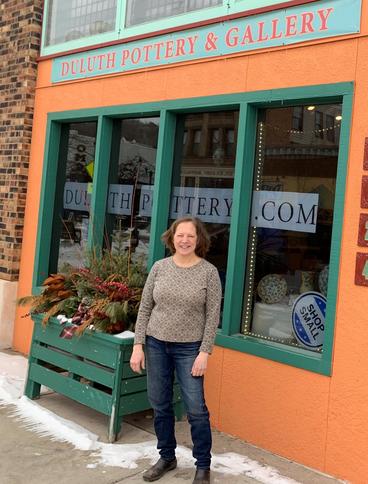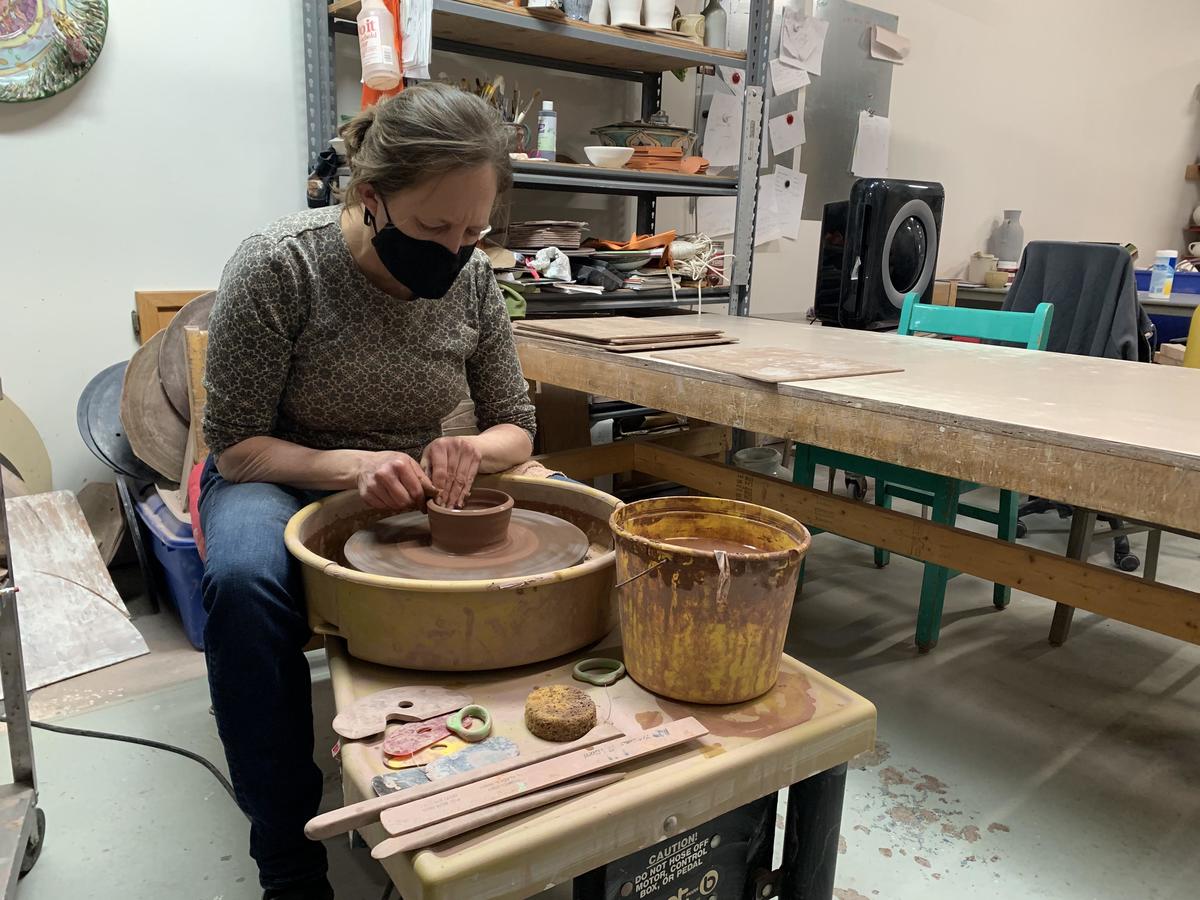When a key piece of equipment quit on potter/artist Karin Kraemer, the manufacturer estimated it would take 8 to 10 weeks to repair.
“And that was devastating. I use this every single day,” said Kraemer. “It’s critical to my business.”
But when she looked in her own community for solutions – a local millwright, a manufacturer of parts – they took the machine apart and put it back together, operational once more, in just two days.
“And they showed me how the machine works and how to fix it myself!” she exclaimed.
Kraemer, owner of Duluth Pottery in the now-thriving Lincoln Park neighborhood, is a cheerleader for the entrepreneurial team spirit in Duluth. She has leaned on support from some of the many organizations in the Arrowhead region that each have a niche in helping entrepreneurs – from idea to development to funding to startup to (hopefully) success.
“Not only do we have a great network between our businesses, we have the Entrepreneur Fund, and Ecolibrium3 and NRRI,” said Kraemer. “I don’t know of any other place with all the resources I have right here in town.”
She received financial and ongoing consulting assistance from the Entrepreneur Fund. Ecolibrium3 organized revitalization of the Lincoln Park Craft District to attract small, local businesses. And Kraemer is now engaging with NRRI to develop an idea she has for a new product.
Wide, Deep Base of Support
In all, there are an estimated 60-plus organizations that – in their unique way – make up the Arrowhead’s “entrepreneurial ecosystem.” And this, on top of the neighborly business network.

“If you think about a healthy ecosystem in nature, it’s balanced and sustainable. And with our entrepreneur ecosystem, each organization fills a unique niche and they work together,” said Tim White, NRRI Business Development manager. “That’s a model for what a good support system looks like.”
And now the State is solidifying that model to understand the overlaps, the gaps and how to measure success with an umbrella initiative called Launch Minnesota. Now one year old, the state-wide, collaborative effort has catalyzed conversations with entrepreneurial support organizations, streamlined access to capital and mapped the resources available.
The program recently provided grant funding to the Itasca Economic Development Corporation (IEDC) to build that hub of support for Northeast Minnesota. And Tamara Lowney has big plans for the program.
“That means we’ll get state funding for education and outreach to entrepreneurs,” explained Lowney, IEDC president and CEO. “We’ll put a heavy focus on tech, incorporate training and develop a speaker series... We’ll build a strategic plan to welcome entrepreneurs to the area.”
The IEDC hosts one of six regional Small Business Development Center sites which allows it to provide hands on business consulting throughout Itasca County at no cost to the client.
“We’ve been really busy with a loan program to help businesses during the COVID pandemic,” said Lowney. “Our challenge is to find the entrepreneurs, pull them out of the woodwork and engage for their success.”
The Entrepreneur Fund – specifically created in the late 1980s to spur entrepreneurship in the Arrowhead region – also has two Women’s Business Center programs to support women entrepreneurs. Sandi Larson is the Director of the Women’s Business Alliance North and provides business advising directly with women. One of the hurdles women are still working to overcome is the fact that up until the 1980s, a woman couldn’t get a bank loan without a co-signer.
“There’s a lingering perception that women might be more likely to fail at business. It’s harder for them to get a loan,” said Larson. “We have programming focused on things they care about, like how to access capital, strategic planning, and networking with other women business owners.”
But more than just removing barriers to accessing financing, the Entrepreneur Fund advises, reviews business plans, provides access to capital, and connects business owners to the resources they need.
The Northland SBDC is also laser-focused on building small business success, with access to flexible capital. They have 23 consultants and provide accounting and marketing expertise. But it doesn’t try to go it alone.
“The region’s success is dependent on our collaboration,” said Michael Colclough, Northland SBDC regional director. “We have a really healthy lending ecosystem and healthy technical assistance available, like what NRRI provides.”
The Iron Range has its own economic engine in the Department of Iron Range Resources and Rehabilitation. Commissioner Mark Phillips describes their niche as “bringing together the funding and partnerships that form the economic landscape of the region -- industry, technology, workforce, education and communities.”
Phillips, a NRRI Advisory Board member, keeps the ties between Iron Range Resources & Rehabilitation and NRRI strong. “We like the NRRI model because it brings the university resources to the table, good scientists and professors who might have an innovation,” he said. “NRRI’s technical expertise in natural resources is critical.”
NRRI Prepares for Lift-Off

And now a new program at NRRI will address the challenges innovations face on the path to commercialization. The LaunchPad, modeled after a similar program in the Twin Cities, will help startups and new business initiatives reach commercialization.
“The LaunchPad concept provides hands-on assessment, training and consulting, increasing the chances for the innovation to reach commercial success,” added NRRI’s Tim White. “We’re hoping to reach people needing technical assistance and can help get them on the right path to move their idea forward.”
